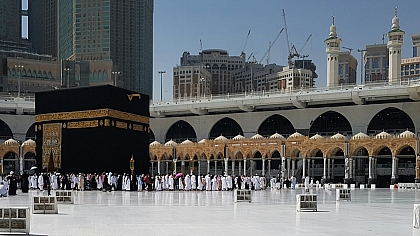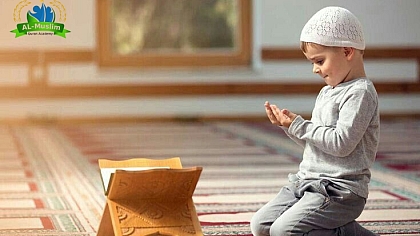
The Importance of Family in Islam: Strengthening Bonds, Building Communities
Family is a fundamental aspect of Islamic culture, with deep roots in the teachings of the Quran and the practices of the Prophet Muhammad (peace be upon him). In Islam, the family is considered the cornerstone of society, and it is believed that strong family relationships are essential for building healthy and vibrant communities.
We will discuss the importance of family in Islamic culture and how it helps strengthen bonds and build communities.
Family in the Quran
The Quran places great emphasis on family relationships, with many verses stressing the importance of treating one's family with kindness, respect, and compassion. These verses highlight the importance of maintaining strong family ties, even in the face of adversity or disagreement.
The Role of Family in Islamic Teachings
The Quran presents the family as a central institution in human life, crucial for the spiritual, emotional, and social well-being of individuals. It emphasizes that the family is not just a social unit but a divine blessing and a test from Allah. The responsibility of maintaining this sacred institution is paramount, as it forms the foundation upon which society is built.
Key Quranic Verses on Family
Several Quranic verses underscore the importance of family. For example, Allah commands kindness to parents in numerous places:

This verse highlights the significance of gratitude and respect towards one's parents, recognizing the sacrifices they make. Another pivotal verse states:

Here, the Quran emphasizes the shared origin of all humans, promoting a sense of brotherhood and unity that starts within the family.
Interpersonal Relationships within the Family
The Quran advises on the conduct between family members, promoting love, mercy, and mutual respect. For example, it mentions:

This verse indicates that marriage is a sign of Allah's mercy and a means to find peace and comfort, encouraging spouses to nurture these qualities. The Quran also stresses justice and equitable treatment within the family, as seen in:

This verse advocates for the fair and kind treatment of wives, emphasizing that even in times of discord, kindness should prevail.
The Family in the Life of the Prophet Muhammad (peace be upon him)
The Prophet Muhammad (peace be upon him) placed great importance on the family, and his life serves as a model for Muslims around the world. He was known for his love and devotion to his wives and children, and he taught his followers the importance of treating their families with kindness and respect.
The Prophet’s Family Life as a Model
The family life of the Prophet Muhammad (Sallallahu Alaihi Wasallam) is a beacon of exemplary conduct for Muslims. His interactions with his family members were characterized by love, respect, and compassion. He provided a living example of how to balance familial duties with religious obligations, making his life a source of guidance for Muslims aiming to cultivate strong family bonds.
Lessons from the Prophet’s Treatment of His Family
The Prophet's (Sallallahu Alaihi Wasallam) relationship with his wives, children, and extended family members teaches valuable lessons on maintaining harmony and understanding within the family. His treatment of his first wife, Khadijah (Radhi Allahu anha), reflects deep love and partnership. He respected her opinions, supported her in times of need, and cherished her contributions to their family and community.
His interactions with his daughter, Fatimah (Radhi Allahu anha), also exemplify his affectionate nature. He often expressed his love and pride for her, reinforcing the importance of valuing and uplifting daughters. Prophet Muhammad (Sallallahu Alaihi Wasallam) also emphasized fair treatment and equity among his children, fostering an environment of justice and love.
Learning from the Seerah also helps families understand the Prophet ﷺ’s approach to conflict resolution, fairness, and teaching values to his children. For example, he would involve his children in discussions, guide them with gentle correction, and use stories from his life to instill moral lessons. These examples make the teachings of Islam tangible and relatable for modern families.
Hadiths Emphasizing Family Values
The Hadith literature is replete with sayings of the Prophet Muhammad (Sallallahu Alaihi Wasallam) that highlight the significance of family. For example, he said:

This Hadith underscores the notion that true piety and excellence in character are reflected in one's treatment of their family. Another Hadith states:

This saying reinforces the values of mercy, respect, and care across all generations within the family, ensuring a nurturing and supportive environment.
The Importance of the Extended Family
In Islamic culture, the concept of family extends beyond the nuclear family to include extended family members such as grandparents, aunts, uncles, and cousins. This extended family network provides a strong support system and helps individuals maintain a sense of connection and belonging.
The Role of Extended Family in Islamic Society
Extended families in Islam play a crucial role in social structure and support. They offer additional layers of emotional, financial, and moral support, enriching the lives of individuals through shared experiences and wisdom. This network of relationships fosters a sense of community and collective responsibility, ensuring that no one is left isolated or unsupported.
Support and Solidarity within the Extended Family
The extended family network acts as a safety net, particularly during times of hardship. Whether it is through financial assistance, emotional support, or practical help, extended family members are expected to stand by each other. This sense of solidarity reinforces the communal values of Islam and ensures the well-being of all members.
The Impact of Extended Family on Individual Well-being
Studies and observations have shown that individuals who maintain close ties with their extended families tend to have better emotional health and a stronger sense of identity. The wisdom and experience of older family members provide guidance, while the youthful energy of the younger generation brings vitality and fresh perspectives.
The Importance of Family in Building Muslim Communities
Strong family relationships are essential for building strong Muslim communities. When families are united, they are better able to work together to promote the values and teachings of Islam. This promotes a sense of unity and solidarity within the community and helps build a strong foundation for the future.
Family as the Building Block of Community
The family is often described as the microcosm of the wider community. The values, practices, and ethics upheld within families are reflected in the larger society. Therefore, nurturing strong family units is essential for the overall health and cohesion of the Muslim Ummah (community).
Collective Responsibilities of Families in Islam
Families in Islam are not only responsible for their well-being but also for the welfare of the community. This includes participating in communal prayers, charity, and social activities that strengthen communal bonds. By fulfilling these responsibilities, families contribute to the moral and spiritual fabric of the community.
Examples of Strong Families Strengthening Communities
There are numerous examples throughout Islamic history and contemporary society where strong family units have played pivotal roles in community building. These families often engage in charitable activities, educational initiatives, and social services, thereby fostering a sense of unity and collective progress.
Challenges to Family Relationships in Modern Times
While family relationships are highly valued in Islamic culture, modern times have brought new challenges to maintaining these relationships. Factors such as technology, globalization, and changing social norms have all contributed to the breakdown of family ties in some communities. However, some steps can be taken to strengthen family relationships and promote unity within Muslim communities.
Modern Challenges to Family Unity
Contemporary challenges such as the fast-paced lifestyle, digital distractions, and the influence of individualistic cultures can strain family relationships. Additionally, migration and the diaspora experience can create physical and emotional distances between family members.
Strategies for Strengthening Family Bonds
To counteract these challenges, families can adopt several strategies rooted in Islamic teachings. These include prioritizing regular family time, fostering open and respectful communication, and practising collective worship and learning. By emphasizing these practices, families can reinforce their bonds and create resilient relationships.
Role of Islamic Teachings in Addressing Modern Challenges
Islamic teachings provide timeless guidance that can help navigate modern challenges. Principles such as patience (sabr), gratitude (shukr), and mutual consultation (shura) are particularly relevant. Applying these principles in daily life can help families overcome difficulties and maintain harmony.
Family is at the heart of Islamic culture, and strong family relationships are essential for building healthy and vibrant communities. By following the teachings of the Quran and the example of the Prophet Muhammad (peace be upon him), Muslims can work to strengthen family bonds and promote unity and solidarity within their communities.
Practical Steps for Improving Family Life following Islamic Teachings
Prioritize Communication
Islam places great emphasis on communication, and family members need to communicate openly and honestly with each other. This includes sharing their thoughts, feelings, and concerns respectfully.
Show Kindness and Respect
In Islam, kindness and respect are essential components of any relationship, especially within the family. Family members should strive to treat each other with compassion and respect, even in the face of disagreements or challenges.
Practice Forgiveness
Forgiveness is another important aspect of Islamic teachings, and it is essential for maintaining strong family relationships. Family members should be willing to forgive each other for mistakes and shortcomings and work towards reconciling any conflicts that arise.
Make Time for Family Activities
Spending quality time together as a family is important for building strong bonds and promoting unity. This can include activities such as going on outings, playing sports, or even simply having family dinners together.
Support Each Other's Growth and Development
In Islam, family members need to support each other's growth and development, both spiritually and personally. This can include helping each other in times of need, providing guidance and advice, and encouraging each other to pursue their goals and aspirations.
By following these and other Islamic teachings, families can work towards improving their relationships and building stronger, more connected communities.









